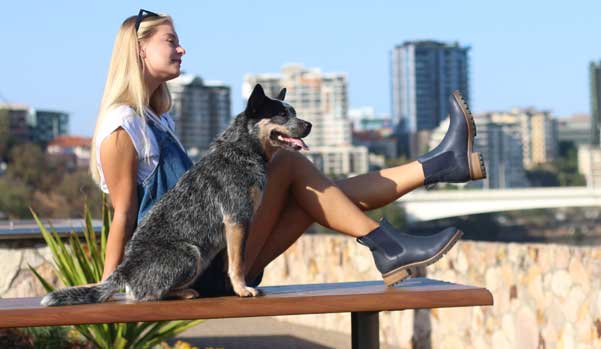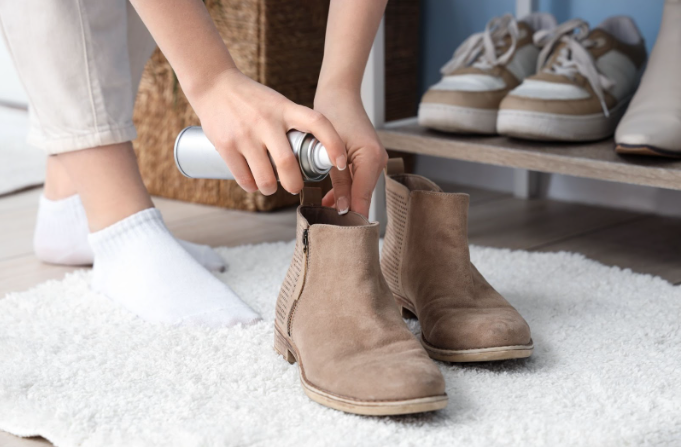Sweaty feet are an unpleasant and often embarrassing problem for those affected. Above all, the sometimes intense odor associated with it can lead to some people not taking their shoes off in company out of shame. This in turn leads to a vicious circle: the feet cannot breathe, which makes the sweating even worse.
It is often wrongly assumed that a lack of hygiene is the main reason for so-called cheese feet. Although inadequate foot care can play a role, there are many other possible triggers. Shoes that are too tight and impermeable to air, certain medications or hormonal fluctuations can promote sweat production, as can stress or physical exertion. Athletes, people with standing jobs or office workers who spend the whole day in tight shoes are particularly affected.
The good news is that you can do a lot to combat sweaty feet and unpleasant foot odor. In this guide, you will find out how sweat develops on your feet, what causes it and which methods really help (including preventative measures) – from simple home remedies and insider tips to breathable materials and practical product recommendations. Sweaty feet will soon be a thing of the past.
Causes of sweaty feet and foot odor: Why feet sweat
First of all, it should be noted that sweating is a completely normal and vital bodily function. It regulates the body’s temperature and protects against overheating.
There are indeed an above-average number of sweat glands on the soles of the feet – around 500 per square centimetre. However, in contrast to other parts of the body, sweating on the feet is not primarily used to regulate heat. It has a different evolutionary background: the light film of moisture on the soles of the feet gave our ancestors better grip when walking barefoot on uneven terrain. Even today, sweat on the feet still fulfills this purpose, even if the need for it in everyday life has diminished.
Interestingly, freshly produced sweat is odorless. It consists mainly of water and contains small amounts of salts and proteins. The unpleasant odor only arises when bacteria on the skin feed on the sweat and decompose it. Among other things, butyric acid is formed in the process – a substance that is responsible for the pungent smell reminiscent of cheese. This is why sweaty feet are often colloquially referred to as cheese feet.
Incorrect footwear and unsuitable socks
The most common reason for sweaty feet is and remains unfavorable footwear: tight shoes or models made of non-breathable materials promote sweating massively, as they hardly allow moisture to evaporate.
The warm and humid climate inside the shoe becomes the ideal breeding ground for bacteria and fungi. Cheap socks made from synthetic fibers further exacerbate the problem, as they absorb sweat less well than natural materials such as cotton or wool. This means that your feet are practically wet all day – even if you don’t notice it, as the moisture is less noticeable due to the warmth. This allows the unpleasant stink to develop undisturbed.
Stress, hormonal changes and nutrition
Mental strain such as stress or anxiety can also stimulate sweat production. Hormonal changes – such as during puberty, pregnancy or the menopause – upset the hormone balance and cause the feet to sweat more.
Diet also plays a role: hot spices, alcohol and caffeine can stimulate the body and promote sweating.
Infections such as athlete’s foot as a cause of odor
Another factor for bad foot odor is infections such as athlete’s foot or nail fungus. Fungi thrive particularly well in a moist environment. Infected skin can flake, itch and ultimately smell particularly unpleasant. Viruses that cause warts also find ideal conditions in warm, damp shoes.
The situation can become very tricky if fungi or parasites are already present, leading to unpleasant odors, and those affected no longer dare to air their feet out of shame. This makes the problem worse and worse.
Genetic predisposition and excessive sweating (hyperhidrosis)
Some people have particularly active sweat glands. This hyperfunction is known as hyperhidrosis and affects around three percent of the population. It can occur locally – often on the feet, hands or armpits – or over the entire body.
People with this predisposition often sweat regardless of temperature or physical activity. The exact cause is not always known, but studies suggest that genetic predisposition plays a role. In some cases, certain conditions such as hyperthyroidism can also trigger excessive sweat production.
When do sweaty feet become a problem?
Occasionally sweating feet are completely normal – especially after sporting activity or on hot days. It becomes critical when the sweat cannot evaporate. If your feet remain in damp socks or tight-fitting shoes all day, the moisture builds up. Not only does this lead to cheesy feet, it also encourages skin irritation, eczema or fungal infections.
But how can you tell whether sweat production is still within the normal range or should be treated? A warning sign is when you really do have wet feet all day – regardless of physical exertion or the outside temperature. Combined symptoms such as itching, burning, discoloration of the skin or cracks between the toes make it even more important to take action. In such cases, you should not hesitate to go to the doctor.
A further signal of the relevance of acute measures is persistent foot odor – despite regular hygiene and fresh socks. Those affected often suffer from their problem in silence, even though effective solutions are available. In many cases, a medical consultation can help to find the right therapy or suitable foot products – from special antiperspirants and medication to surgical measures for severe hyperhidrosis.
Immediate measures against sweaty feet – this helps quickly and safely
If your feet are already sweating and the unpleasant odor is noticeable, you want to find a solution quickly. This is not about long-term prevention – we will deal with that later – but about immediately effective tips that you can easily implement in your everyday life.
Whether at home, in the office or on the go: these measures will help you to quickly get to grips with sweaty feet and avoid unpleasant situations. In addition to tried-and-tested classics, you’ll also find insider tips that not everyone knows about but are surprisingly effective.
Acute tips for everyday life
Washing your feet: How often and with what products?
Regular washing is the easiest and quickest way to get sweaty feet fresh again. But not every wash is equally effective. It is best to use lukewarm soap solutions with antibacterial ingredients – these not only remove sweat, but also fight the bacteria responsible for the unpleasant odor. Plain water or conventional soaps are often not enough, as they do not reliably remove the cause – the bacteria.
Insider tip: After washing, it helps to gently dry your feet with a hairdryer on a low setting – especially between the toes. Moisture in the skin folds is an ideal breeding ground for bacteria.
Foot powder, antiperspirants and deodorants especially for the feet
A conventional deodorant simply masks foot odor, but there are special antiperspirants that are designed to directly reduce sweat production. They contain aluminum salts that constrict the sweat glands and thus prevent too much fluid from escaping. Important: Ideally, apply antiperspirants in the evening before going to bed so that they can work overnight (which brings us a little closer to prophylaxis). However, they can also help when you’re out and about – for example in the office or on a business trip on the train.
For a quick solution in the morning or in between, foot powder has proven its worth for many sufferers. It absorbs moisture, prevents friction and reduces the formation of bacteria. Foot deodorants in spray or roll-on form are particularly practical for on the go, but less effective in the long term – simply apply to the feet, leave to dry briefly and everything will feel fresher.
Insider tip: Baby powder can be an inexpensive substitute for special foot powder – it binds moisture very well and makes the skin feel dry.
Proven home remedies for sweaty feet
Foot baths with sage or black tea
A warm foot bath is not only soothing, but can also effectively help against sweaty feet. The tannins often contained in the solutions tighten the skin pores and reduce sweat production.
Sage is ideal as it contains natural tannins that soothe the sweat glands. Pour a liter of boiling water over two tablespoons of dried sage leaves, leave to infuse and add to the foot bath. 15 minutes is enough. The tannins contained in black tea also reduce perspiration and bacterial growth.
Insider tip: If you don’t have the time or the right utensils for an extended foot bath (e.g. when traveling), you can also use a washcloth soaked in black tea and rub your feet directly.
Baking soda against bacteria and odors
Bicarbonate of soda is a real all-rounder in the household and excellent for combating sweaty feet. It neutralizes acids, inhibits bacterial growth and binds moisture.
Simply sprinkle some baking soda on your feet or directly into your socks before you put them on. Alternatively, you can make a paste from baking soda and water and apply it to your feet before going to bed.
Insider tip: Sprinkle baking soda into the shoes and leave overnight – shake out well the next morning – helps to draw sweat and odor out of the shoe material.
Reduce spicy food: Influence of diet on sweat production
Many people underestimate the influence of diet on sweat production. Especially spicy food with chili, pepper or curry can stimulate the metabolism and increase sweating. If you notice that you sweat more after such meals, it helps to reduce these spices before important appointments or long walks.
Insider tip: Instead of spicy foods, focus more on cooling foods such as cucumber, mint or green tea. These help the body to regulate itself from the inside out.
The best materials and products to combat sweaty feet
If you want to avoid sweaty feet, you should use breathable materials or appropriate footwear.
Combination of natural and functional materials
Natural fabrics such as cotton, wool and merino wool are ideal remedies for sweaty feet, as they absorb moisture and allow the skin to breathe. High-quality synthetic fibers can also be helpful if they have a moisture-wicking effect – cheap versions, on the other hand, tend to accumulate sweat.
In everyday life, combinations of natural and technical fabrics are often a good choice. The layering principle has proven to be particularly effective: Two thin socks – one to wick away moisture, the other for insulation – keep your feet drier than one thick pair.
Matching products from our store
The right shoes play a crucial role. Breathable models prevent heat and moisture from building up. The JACKAROO from our store, for example, is made from breathable, skin-friendly leather and therefore promotes a pleasant foot climate.
Insoles are another often very effective remedy for sweaty feet – especially in the cold season. The lambskin insoles from our store form a warm but airy foot base in the shoe. Good circulation properties reduce odors.
Remove sweat shoes odor
Finally, you should also make sure you look after your shoes properly. In addition to sweat, they can also absorb many other unpleasant odors from the environment. It is therefore advisable to air and shake them out regularly – ideally before your shoes start to stink!
If the odor persists, it may help to wash the shoes – but follow the manufacturer’s instructions to avoid damaging the material. Air drying, ideally with newspaper inside, also helps to eliminate odors.
Tips for preventing foot odor
Proper prevention is crucial to prevent feet from smelling in the first place. Hygiene plays an important role here – but be careful: excessive washing can damage the skin and weaken the natural protective barrier. Instead, you should clean your feet once or twice a day as described above.
Another important step is to recognize your own triggers for foot odour. Do your feet sweat more in certain shoes or under stress? Then you can take targeted countermeasures. Whenever possible, you should wear open shoes to promote air circulation and prevent moisture build-up. Especially in the warmer months, it is helpful to walk barefoot from time to time – for example at home or on soft ground outdoors. This gives the skin a chance to breathe and reduces perspiration.
When choosing shoes and socks, stay away from cheap materials! Synthetic materials without breathability hardly allow any air to reach the skin and encourage sweating. Instead, opt for high-quality natural materials such as leather or wool, which wick away moisture and minimize odours. It is also advisable to leave shoes to rest for at least 24 hours after wearing them for a long time to allow moisture to dry out completely.
Conclusion
Sweaty feet and unpleasant foot odor are annoying problems that can be effectively managed with the right measures. Breathable materials or suitable shoes, regular hygiene, but also household remedies and conscious behavior help to prevent smelly feet in the long term.
Fresh feet for the whole day! Discover our shoes and care products that keep your feet healthy and fresh.







